Similarities between air showers and ATLAS forward physics
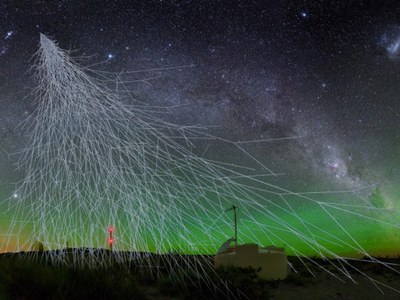
Strong interactions in a regime of low momentum transfer (so-called soft interactions) cannot be treated perturbatively, which makes the modelling of such processes strongly dependent on experimental input from hadron colliders. In hadron-hadron collisions, e.g. at the LHC, such soft hadronic interactions manifest themselves by the creation of particles in the very forward regions (which means at large rapidities). This process is the same when a cosmic particle hits the atmosphere and interacts with the atoms of the air, creating a cosmic air shower. The picture here shows a simulated air shower over the Auger observatory (courtesy of Chantelauze/Staffi/Bret).
Measurements with the forward detectors of and around ATLAS
These forward-pointing collisions can be measured either by calorimeters in the ultra-forward region of ATLAS, ZDC, or the LHCf detector which can detect neutral particles or by tracking devices located close to the beam like ATLAS AFP and ALFA detectors, which are used for the detection of scattered protons. The location of these detectors can be seen in the sketch below (by C. Leitgeb). The measured particle spectra and cross-sections will help to tune the currently available phenomenological models for soft hadronic interactions. The improved accuracy of such models would benefit the simulation of air showers induced by cosmic particles as well as the understanding of strong interaction background in proton-proton collisions at the LHC (so-called pile-up). Part of the group is working on the preparations of such measurements with the aforementioned detectors for the current run at the LHC for proton-proton collisions as well as for the foreseen proton-oxygen collisions. Furthermore, we are cooperating with the DESY Zeuthen gamma-ray group to exploit synergies in that topic.
In this group, we conducted feasibility studies on the potential of a combined data taking of a forward neutral particle calorimeter and a forward proton detector, which led to the AFP detector joining the LHCf special run in 2022. This is the very first time such data was taken and it could provide completely new access to low-mass diffraction processes. This special regime of soft strong interactions has previously been lacking any direct experimental constraint at high energies while having a significant impact on measurements of the total inelastic proton-proton cross section at the LHC. The feasibility studies have been published on the CERN document server: https://cds.cern.ch/record/2871727.

LHCf Event Display
An electromagnetic shower is simulated for a 20 GeV electron incident onto the LHCf detector. The detector is a calorimeter with the purpose of reconstructing the incident particle energy. In green you see the tungsten absorber plates in which the shower formation is developing.
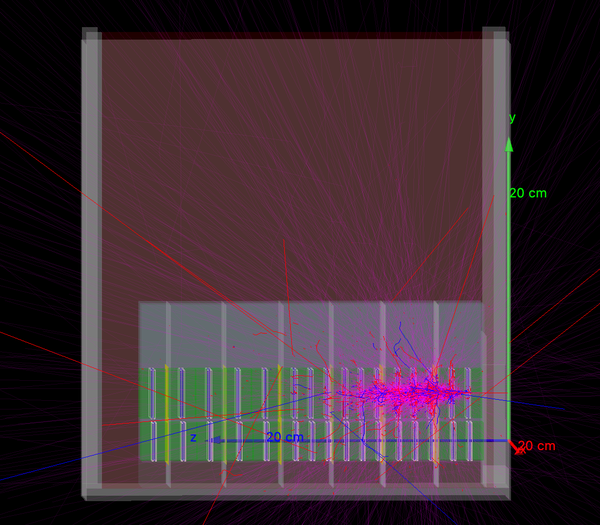
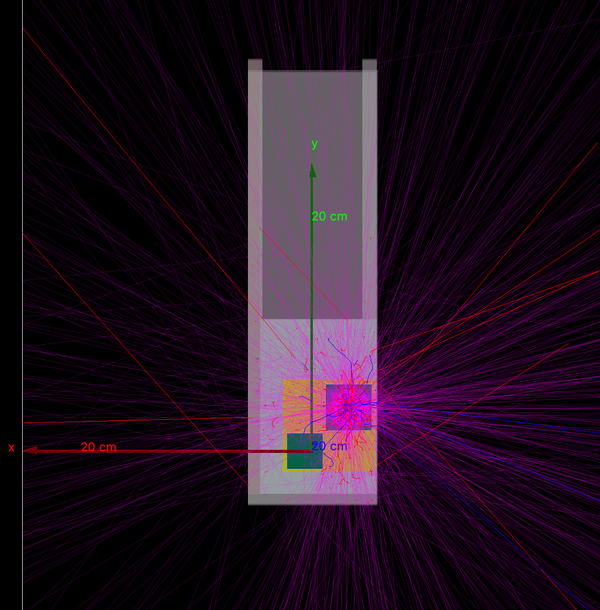
The different particle types created in an electromagnetic shower process are shown in the following colors: Photons (magenta), electrons (red) and positrons (blue). Most particles are contained within the detector and generate a signal in the 16 scintillator layers (blue) or silicon layers (yellow).
The simulated data output of a typical event of a 150 GeV electron and muon is shown below. The detector consists of 16 scintillation layers that measure the deposited energy as a function of depth in the detector (longitudinal z-direction). Silicon sensors are highly segmented as strips in the lateral direction and thus measure the lateral shower profile (x-y direction). The electron is incident onto the large tower and its shower profile exhibits a maximum in its third scintillation layer. Some low energetic secondary particles leak into the small tower. Note the smaller energy scale in the small tower. The silicon data shows a peaked distribution giving information on the x-y coordinates of the incident electron.
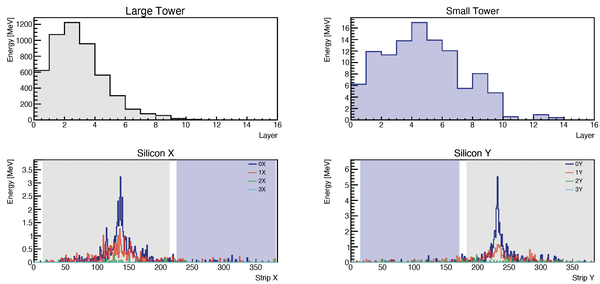
A typical muon event entering the large tower at 150 GeV as shown below does not create secondary particles. The muon can penetrate the whole detector as seen from energy depositions in all scintillator layers. No energy is leaked to the small tower. In x-y direction all depositions happen within a single silicon strip:
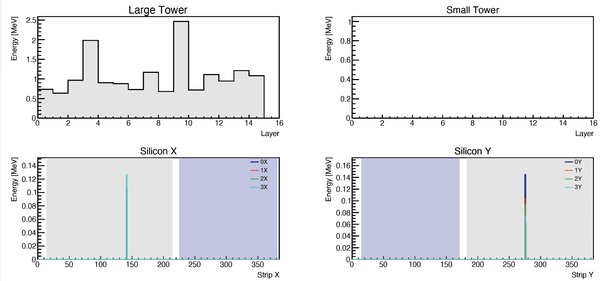
Potential thesis topics:
You can find potential thesis topics under this link. If you are interested in one of those topics or in working on a project in forward physics in general, please contact Dr. Clara Leitgeb (clara.leitgeb@physik.hu-berlin.de) or Prof. Cigdem Issever (isseverc@hu-berlin.de).
